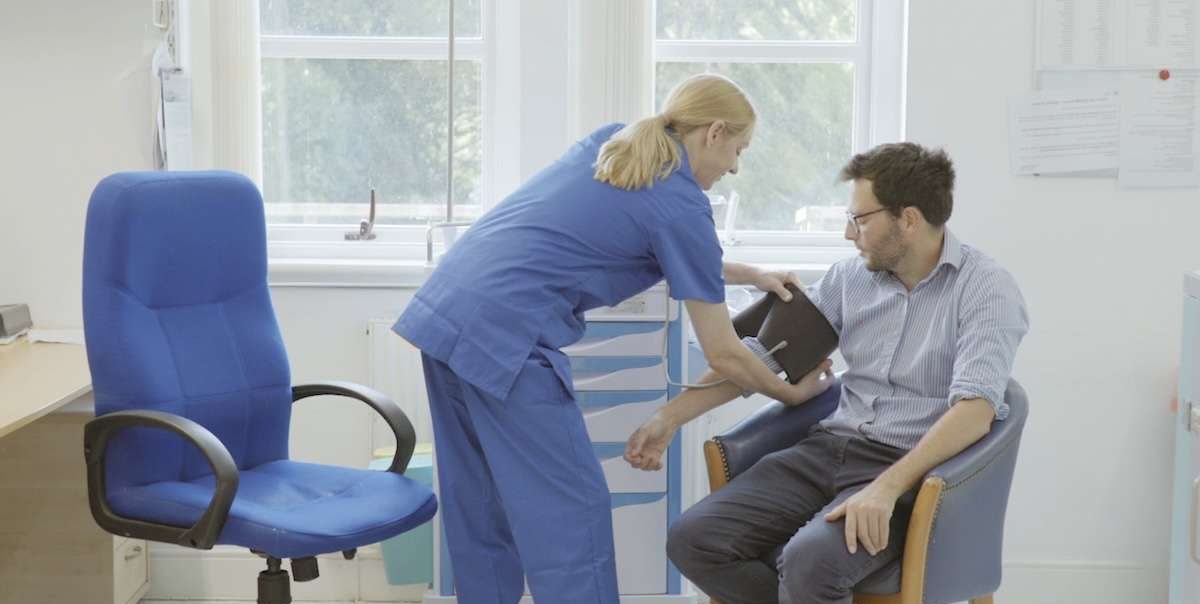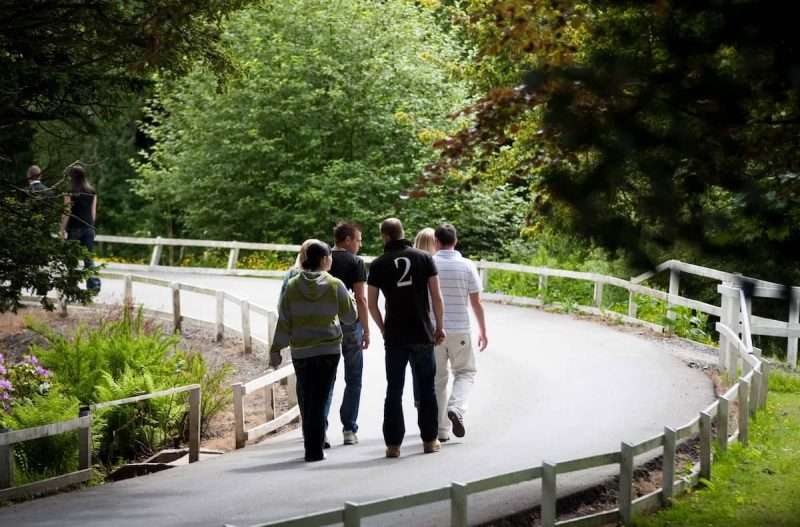
Residential Ketamine Detox Treatment
At Castle Craig, we specialise in medically managed ketamine detox within a residential setting. Our dedicated 11-bed detox centre is located in the beautiful Scottish Borders countryside, allowing patients to remove themselves from daily triggers and temptations in a safe environment. Our focus on expert, personalised care distinguishes our approach to ketamine addiction recovery.
This article provides important information about ketamine detox. You will learn about ketamine detox symptoms, how long withdrawals might last and the available medications for ketamine detox. To find out more about our medically managed drug detox treatment, or if a loved one is struggling with ketamine addiction and doesn’t know where to turn, we encourage you to get in touch as soon as possible. Call us on 01721 546 263 today for kind, compassionate and professional help.
What is Ketamine Detoxification?
Ketamine detoxification is the process of safely clearing ketamine from a person’s body. It involves handling the physical and mental withdrawal symptoms that appear once ketamine use stops. The detox phase of rehabilitation helps stabilise patients and reduce discomfort during this challenging time.
The main goal of ketamine detox is to stabilise an individual’s body after they stop using the substance. This is the very first step in overcoming ketamine addiction, though not all patients may require it. After detox, participants can move on to deeper ketamine rehab treatment that addresses the reasons behind their substance misuse.
What is a Medically Managed Ketamine Detox?
A medically managed ketamine detox means withdrawing from ketamine under constant medical care. Doctors and nurses are present to watch over your health and offer support. This oversight helps to make sure that the detox process is as safe and comfortable as possible, reducing potential risks.
Medically managed detox brings many benefits. It greatly reduces the chance of serious problems during ketamine withdrawal. Medical staff can give medicines where required to ease symptoms, monitor vital signs and support your mental state. This careful attention helps set a strong foundation for recovery from ketamine dependency.

Start Your Recovery at a Residential Rehab Today
Difference Between Medically Managed Ketamine Detox and Medically Supervised Ketamine Detox
The terms medically managed ketamine detox and medically supervised ketamine detox are largely used in the same way. Both phrases mean that doctors and nurses are actively involved in looking after a person during withdrawal, though medically managed detox may offer more intervention to aid symptom relief.
Regardless of the exact word used, the presence of trained medical staff is key. Their role is to prevent or handle any health problems that might arise. This support helps ease withdrawal symptoms and means that the patient is properly cared for throughout the ketamine detoxification process.
Free Ketamine Addiction Assessment
Taking a brave step towards drug and ketamine addiction treatment can feel like a big decision. We offer free, confidential assessments, providing a private space for you to share your situation with a professional. This initial discussion helps us understand your needs and gives you suitable options for your journey ahead, all without any pressure.
Following your assessment, we can shape a residential ketamine treatment plan that perfectly suits your recovery needs. This plan is carefully put together based on what we learn from your consultation, giving you clear steps for healing and lasting change. To talk about starting your personal rehab journey and find out how our support can help, call our friendly team on 01721 546 263.
Free Ketamine Addiction Assessment
Taking the first step and asking for help can feel daunting, but our team is here to assist you.
Benefits of Inpatient Residential Ketamine Detox and Withdrawal Treatment
Choosing inpatient residential ketamine detox and withdrawal treatment brings many specific advantages. This type of specialised care offers a safe and structured setting, allowing patients to focus fully on their early recovery from ketamine addiction. The level of support provided in residential detox programmes helps manage both physical and mental challenges during withdrawal.
The initial stages of healing from addiction benefit greatly from this dedicated support. Below, we explore various specific advantages of opting for residential care during ketamine detoxification, highlighting how inpatient environments are designed to promote lasting sobriety and overall well-being.
-
24/7 Medical Supervision in a Residential Rehab Setting
Receiving 24/7 medical supervision in a residential rehab setting is a key benefit for ketamine detox. Doctors and nurses are always on hand to watch over your health, helping you feel safe and reassured. This constant vigilance helps catch and manage any physical or mental changes that appear during ketamine withdrawal.
Round-the-clock presence helps reduce the risk of complications during ketamine detox. Medical staff can give immediate support, offer medicines to ease symptoms, and make sure patients are as comfortable as possible. This level of continuous care provides a strong sense of security, especially as each person’s detox symptoms may be different.
-
Safe Withdrawal Management for Dissociative Drug Dependence
Safe withdrawal management is crucial for dissociative drug dependence, like ketamine addiction. Dissociative substances can cause unpredictable symptoms during detox, making expert oversight essential. A medically managed approach helps guide people through the physical and mental effects, prioritising their comfort and safety.
At Castle Craig, we provide skilled withdrawal management for ketamine addiction. Our medically managed detox helps ensure a safe and comfortable environment for you. A team of trained experts oversees your physical and mental well-being with personalised attention, helping you move safely through the ketamine detoxification process within our residential setting.
-
Structured Environment With No Access to Club Drugs
A structured environment with no access to club drugs is a major benefit of inpatient ketamine detox. Being removed from external temptations, like easy access to substances, helps people focus solely on recovery. This setting creates a clear boundary, making it easier to break old patterns of ketamine misuse.
A structured setting also helps people develop new coping skills without constant outside distractions. The focus shifts entirely to healing and self-improvement. This supportive space promotes mental clarity and discipline, helping patients build a strong foundation for sobriety away from familiar drug-using environments.
-
Immediate Mental Health Support During Detoxification
Immediate mental health support during detoxification is highly important for ketamine withdrawal. The process can bring strong emotions, anxiety or even confusion. Having quick access to mental health professionals helps patients manage these difficult feelings, providing reassurance and guidance from the very beginning of substance addiction treatment.
At Castle Craig, we provide immediate mental health support during ketamine detox. Our specialist team understands the emotional challenges that arise during withdrawal. We offer swift access to counselling and psychiatric care, helping you manage mental distress and supporting your overall well-being throughout your early recovery journey.
-
Personalised Care Plans in a Nature-Based Rehab Centre
Care plans in a nature-based rehab centre are shaped for each person’s specific journey. This helps the addiction treatment address individual healing for ketamine addiction. Calm surroundings complement therapies, helping people connect with themselves and find a renewed sense of purpose during recovery.
This thoughtful approach considers a person’s background, health and goals for ketamine addiction recovery. Rehab therapies are adjusted to fit what works best for them, both in clinical sessions and outdoor activities. This helps people receive support that truly resonates, building a solid foundation for long-term abstinence.
-
Emotional and Therapeutic Support From Trained Staff
Receiving emotional and therapeutic support from trained staff is a huge benefit of inpatient ketamine detox. Professionals provide guidance for both the physical and mental aspects of withdrawal. Their presence helps people feel heard and understood, creating a safe space for open discussion and healing during ketamine addiction treatment.
At Castle Craig, our team offers deeply understanding support. Some of our staff are in recovery themselves, bringing lived experience to their professional roles. This helps them truly connect with people during ketamine rehab treatment, offering guidance that comes from a place of shared understanding and genuine care.
-
Reduced Risk of Relapse in a Structured Setting
A reduced risk of relapse is another benefit of a structured setting for ketamine addiction recovery. Being away from familiar triggers and negative influences helps individuals focus solely on their goals for the future. A secure environment provides safety, making it easier to break old habits and build new, healthier routines.
The consistent support and structure found in an inpatient rehabilitation setting also help patients manage cravings and develop coping skills. Without outside distractions, people can fully engage in their addiction treatment, learning strategies to prevent future ketamine misuse. This solid foundation greatly supports lasting sobriety after discharge from rehab.
-
Private Countryside Rehab With Peaceful Natural Surroundings
A private rehab in the countryside offers a distinct environment for ketamine addiction treatment. Peaceful, natural surroundings provide a sense of calm and privacy, helping patients fully immerse themselves in recovery. Being away from urban noise and scrutiny allows for deeper reflection and focused work without interruption.
Castle Craig is a private residential ketamine detox clinic set in the beautiful Scottish Borders countryside. Our Georgian estate offers a quiet place to retreat for recovery from drug addiction. We provide a truly peaceful setting, helping you find calm and dedicate yourself solely to your ketamine addiction treatment away from daily life’s demands.
Private Medically Managed Ketamine Detox Centre Near Me
Choosing a private, medically managed ketamine detox centre provides you with dedicated support for stopping ketamine use safely. Private rehab clinics for ketamine in the UK offer a structured and secure environment, helping you manage withdrawal symptoms with expert medical oversight. Finding a suitable detox facility is an important step towards healing from ketamine addiction.

Contact Castle Craig Residential Detox Centre
To connect with our private residential ketamine detox centre, you will find us at West Linton, Edinburgh, United Kingdom, EH46 7DH. Our location in the Scottish Borders offers a beautiful countryside setting. Surrounded by rolling hills and peaceful views, our rehab facility provides a calm atmosphere highly conducive to recovery from drug addiction.
Find Us
01721 546 263
info@castlecraig.co.uk
Castle Craig,
West Linton, Edinburgh, United Kingdom, EH46 7DH
If you are seeking residential treatment for drug or ketamine dependency, our committed team is ready to assist you. To find out how our expert care and discreet location can support your recovery, call us today on 01721 546 263 or fill out our confidential online form now.
-
How to Find Private Ketamine Detoxification Centres Near You
Finding the right private inpatient ketamine detoxification centre near you involves knowing where to look and what questions to find answers to. The following steps can guide your search, helping you identify a ketamine detox clinic that matches your needs for safe ketamine detox and effective addiction treatment.
- Search for “Private Ketamine Detox Near Me” or Include Your Location: Begin your search by using specific online phrases such as “private ketamine detox near me” or “ketamine detox clinic in the UK.” Adding your town or city, for example “in London” or “near Glasgow”, helps narrow down ketamine rehab facilities that are conveniently close to you.
- Look for Medical Supervision and 24/7 Support: Detoxing from ketamine can bring challenging withdrawal symptoms that need close attention. Choose a drug rehab centre with medically managed ketamine detox care and round-the-clock support. This helps ensure immediate assistance if symptoms intensify, putting your safety and comfort first during withdrawal
- Read Reviews and Testimonials: Reading reviews from previous patients offers insight into a ketamine addiction treatment centre’s quality of care. Look for testimonials that highlight accredited, professional treatment, a kind team and positive outcomes. This provides a clear picture of what to expect and helps you choose with confidence.
- Consider What’s Included in the Programme: Evaluate the therapies, amenities and additional supports offered, such as one-to-one addiction counselling, group therapy or well-being sessions. A setting that promotes overall physical and emotional recovery is crucial, so always check how the centre handles ketamine addiction recovery in detail.
- Enquire About Ketamine Rehab Costs and Payment Options: Ask about the overall costs of ketamine detox and the admissions process. The costs for drug rehab vary between centres in the UK. Learning the scope of charges, what is included and whether a free assessment is available for ketamine detox can help you plan ahead.
- Check if They Accept Health Insurance: If you have private health insurance, ask about coverage for ketamine detox and rehab. Many residential ketamine detox clinics in the UK accept policies from major providers. Confirm which costs are covered and whether there are any out-of-pocket expenses. This can greatly affect your access to treatment.
Find Out About Our Residential Ketamine Detox Treatment
Deciding to detox from ketamine is a courageous first step, but the journey to lasting sobriety continues beyond withdrawal. At Castle Craig, we offer crucial, dedicated support for ketamine addiction following detox. Our approach helps people build the foundations for long-term recovery, addressing the underlying issues after physical stabilisation.
We truly understand that ongoing help is essential for a new beginning. Our team is here to guide you through the next phases of your recovery. To talk about securing support for ketamine addiction treatment that extends beyond detox, please get in touch with us on 01721 546 263.
Signs, Symptoms and Effects of Ketamine Withdrawal & Detoxification
Stopping ketamine use can lead to various physical and psychological effects as the body adjusts. These are some common signs, symptoms and effects people might experience during ketamine withdrawal and detoxification, but it is not a full list. Understanding these can help you prepare mentally and physically for detox from ketamine in a safe environment.
-
Early Signs of Ketamine Withdrawal
Initial signs of ketamine withdrawal typically appear within hours to a day after the last dose, marking the beginning of the detox process.
- Irritability or mood swings: You may notice quick changes in your temper or feelings.
- Restlessness or unease: A feeling of being fidgety or generally uncomfortable in your own skin.
- Difficulty sleeping: You might find it hard to fall asleep or stay asleep for long.
- Fatigue or low energy: Feeling very tired or simply lacking usual drive and strength.
- Cravings for ketamine: Experiencing strong, repeated urges or desires to use ketamine again.
-
Moderate to Severe Symptoms of Ketamine Withdrawal
More intense symptoms can often develop within a day or two of stopping ketamine and may last for several days. These challenges often require medical support.
- Intense anxiety or panic attacks: Overwhelming feelings of fear or sudden episodes of intense dread.
- Severe depression or suicidal thoughts: Experiencing deep, persistent sadness or thoughts of harming oneself.
- Confusion or disorientation: Feeling mixed up, disoriented or unsure of your surroundings.
- Physical pain or body aches: Widespread discomfort or a general soreness throughout your body.
- Rapid heart rate or high blood pressure: Your heart beating very fast or your blood pressure rising unexpectedly.
-
Psychological Effects of Ketamine Withdrawal
Psychological effects can be particularly difficult during ketamine withdrawal and sometimes last longer than physical symptoms, requiring ongoing rehab support.
- Mood instability or emotional numbness: You might experience quick changes in your feelings or feel nothing at all.
- Intrusive or disturbing thoughts: Unwanted, upsetting thoughts or images that repeatedly come into your mind.
- Loss of motivation or apathy: A noticeable lack of interest or energy for activities you once enjoyed.
- Difficulty concentrating: Finding it hard to focus your attention or think clearly about tasks.
- Increased paranoia or fear: Strong feelings of suspicion towards others or feeling unusually afraid.
-
Physical Signs and Symptoms During Ketamine Detoxification
Physical signs are a key part of the body’s reaction as ketamine leaves the system, showing up throughout the acute detoxification phase.
- Sweating and chills: Feeling hot and clammy, then quickly turning cold and experiencing shivers.
- Nausea or vomiting: Feeling sick to your stomach, which can lead to throwing up.
- Shaking or tremors: Uncontrollable trembling or wobbling of parts of your body.
- Headaches or muscle cramps: Experiencing pain in your head or tight, sore feelings in your muscles.
- Sleep disturbances or vivid dreams: Trouble getting proper rest, or having intense, very lifelike dreams.
-
Long-Term Effects Without Proper Ketamine Detox Support
Without proper ketamine detox support, some effects of withdrawal can last or get worse over time, impacting long-term recovery and well-being.
- Persistent mental health issues (e.g. anxiety, depression): Lingering feelings of worry or sadness that continue for a long time.
- Cognitive impairment or memory problems: Finding it hard to think, focus, or remember things clearly.
- Increased risk of relapse or overdose: A higher chance of using ketamine again, which could lead to a very dangerous or even fatal overdose.
- Damage to bladder and urinary tract: Harm to the organs involved in holding and passing urine, known as ‘K-hole bladder’ or ‘ketamine bladder.’
- Ongoing emotional instability and social withdrawal: Continued quick mood changes and a tendency to avoid other people.

Medications Used for Ketamine Detoxification
Medication may or may not be used during ketamine detoxification. This decision is made case by case, depending on a person’s specific needs and the severity of their ketamine addiction. Some medicines help manage strong withdrawal symptoms, but they must always be given in a clinical professional setting due to potential risks.
These are some common medications that might be used:
- Benzodiazepines: These help reduce anxiety and prevent seizures during withdrawal from ketamine. They must be medically managed in a clinical setting due to their potential for dependence.
- Antidepressants: Professionals may prescribe these to help manage low mood or anxiety that can appear or worsen during ketamine detox. They provide support for emotional changes.
- Antipsychotics: These are used if severe agitation, hallucinations or other psychotic symptoms occur during ketamine withdrawal. They are always given under strict medical guidance in a safe environment.
- Sleep Aids: Medicines to help with severe insomnia or difficulty sleeping can be used for a short time during ketamine detox. They are given under medical direction to promote rest during this difficult period.
- Pain Relievers: Prescribed pain relievers help ease muscle aches and general body pains linked to ketamine withdrawal symptoms. They can provide some relief from physical discomfort.
- Beta-Blockers: These medicines help control physical symptoms such as high blood pressure or a fast heart rate that can occur during ketamine detox. They work to stabilise the body’s response.
- Nutritional Supplements: These support physical recovery during detox. They can help replenish lost vitamins and minerals, assisting the body in regaining strength and overall stability after ketamine misuse.
At Castle Craig, our approach to the use of ketamine detox medications is conducted with the highest level of responsibility so that they do not result in a new dependency. We understand that this may be a concern for some patients, and we are here to assure you that detox medicines are prescribed only when clinically necessary and are closely managed under the care of our Consultant Psychiatrist and trained medical staff.
Our goal is to alleviate withdrawal symptoms safely while focusing on your overall recovery and the goal of abstinence. By using evidence-based protocols and regularly assessing your progress, we only use ketamine detox medications as a short-term tool to support your transition into sobriety, always prioritising your long-term health, well-being and abstinence.

Contact Castle Craig Today
If you are ready to start ketamine detox treatment or want to learn more, don’t hesitate to contact our team. You can book a free drug addiction assessment today or ask us to explain our admissions process in more detail.
Our goal is to make starting your recovery as simple as possible. To speak directly with our team, call us now on 01721 546 263. Alternatively, you can easily share your details by filling out the online form below. We are ready to help you begin your journey towards lasting change.
Does Health and Medical Insurance Cover Ketamine Detoxification Treatment?
Yes, health and medical insurance can often provide cover for ketamine detoxification treatment in the UK. This depends on your specific insurance policy, its level of benefits and any applicable exclusions. It is always wise to directly check your plan details with your provider to understand what is included for ketamine addiction treatment.
If your cover is approved and you are authorised for treatment at our facility, Castle Craig accepts private health or medical insurance from many major providers. Our team can explain how your policy with Aetna, Bupa, Vitality and many more might support your journey. To discuss access to ketamine addiction treatment or to arrange your admission, please contact us on 01721 546 263.
How Much Does Residential Ketamine Detox Cost in the UK?
The cost for a ketamine detox alone in the UK typically ranges from £1,000 to £6,000 for a 7 to 10-day period. This initial step is usually part of a longer addiction treatment programme. For residential ketamine rehab, including detox, the daily cost is roughly £650 to £1,500, or £4,500 to £10,000 per week.
Exact residential ketamine detox costs may change depending on a person’s specific circumstances and the overall length of their addiction treatment. Factors like the intensity of care needed or any specialised support can influence the final price. These variations reflect an effort to match ketamine rehab care to each person’s journey towards recovery.
Ketamine Detox Timeline and How Long It Takes
Ketamine detox is typically the initial start of a full ketamine rehab process. Understanding typical ketamine detox timelines and how long detoxing takes can help you prepare. However, it is strongly recommended that you complete a full rehab programme if advised by a healthcare expert after an initial assessment. This gives you the best chance for a longer, sustainable recovery without future relapses.
-
Stage 1: Early Withdrawal Symptoms (6–12 Hours After Last Dose)
Early ketamine withdrawal symptoms usually appear within six to twelve hours of the last dose. This initial stage marks the body’s first reaction to no longer having ketamine in its system. Withdrawal symptoms at this point are often mild but can quickly become noticeable as ketamine detox begins.
During the early phase, individuals might experience feelings of unease or increased irritability. Restlessness and some difficulty sleeping are also common. You may also start to feel tired or have low energy levels, alongside the first urges or cravings for ketamine.
-
Stage 2: Peak Ketamine Withdrawal Symptoms (24–72 Hours)
The most intense period of ketamine withdrawal typically occurs between 24 and 72 hours after the last dose. Detox symptoms are usually at their strongest during this stage, making it very challenging without proper support. This is when the body is most actively trying to adjust without the substance.
People might experience intense anxiety or even panic attacks. Severe depression or confused thoughts can also appear. Physical pain, body aches and a rapid heart rate are common. Managing these ketamine withdrawal symptoms safely often requires medical help to ease discomfort and ensure stability.
-
Stage 3: Subsiding Symptoms and Stabilisation (3–7 Days)
By three to seven days, ketamine withdrawal symptoms generally begin to lessen, and the body starts to stabilise. While some discomfort may remain, the most severe effects typically subside. This stage focuses on bringing a person’s physical and mental state back to a more balanced level.
During this time, the focus shifts towards preparing for the next steps in ketamine addiction recovery. Patients work on regaining strength and clarity, ready to engage in therapies that address the deeper reasons behind their ketamine misuse. This period builds a foundation for lasting change beyond detox.

Related Guides on Medically Managed Residential Detox
Detox Centre | Inpatient Detox | Alcohol | Drugs | Cocaine | Heroin | Crystal Meth | Valium | Tramadol | Benzodiazepines | Xanax | Codeine | Opioid | Ecstasy | Morphine | Amphetamine | Cannabis
Inpatient Medically Managed Ketamine Detox Treatment Admissions Process
Starting your recovery at an inpatient medically managed ketamine detox centre involves a clear path. We aim to make your admission smooth and supportive. This structured journey helps you feel prepared and confident as you begin your residential drug or alcohol addiction treatment. Here are the key steps involved in our admissions process at Castle Craig:
- Enquire and Complete Assessment: Your journey starts with an enquiry to our admissions team. They help you book a free, confidential assessment for a chance to discuss your needs for ketamine addiction treatment. This initial talk helps us appreciate your situation and confirms if our centre is the right fit for your recovery.
- Medical and Psychological Evaluation: Following your first contact, you will complete a detailed medical and psychological evaluation by our clinical team. This lets us understand your full health picture, including substance misuse history and mental health concerns, guiding us in creating a safe and effective ketamine detox plan for you.
- Admission Approval and Date Confirmation: Once your evaluation is complete and our team confirms our centre is a good fit, you will receive admission approval. We then work with you to confirm your start dates and finalise all necessary arrangements. This step confirms your readiness to begin inpatient ketamine detox and brings peace of mind that help is on the way.
- Travel Planning and Preparation: We then discuss practical matters, including your travel to our residential ketamine detox clinic. We offer guidance and help with planning your journey to our Scottish Borders location. Careful preparation helps make your arrival stress-free, allowing you to focus on your upcoming ketamine addiction treatment.
- Arrive and Begin Detox Programme: Upon your arrival at our inpatient ketamine detox centre, our welcoming team will greet you. They help you settle into your new surroundings. You then begin your medically managed ketamine detox, where our expert medical team guides you through each step of the withdrawal process towards lasting health and freedom from ketamine dependency.
Questions About Detox for Ketamine?
Contact us to discuss your treatment needs with a licensed clinician.
Find Out About Our Residential Detox Treatment
At Castle Craig, our ability to provide ketamine detox stems from a blend of expert care and deep understanding. Our trained professionals provide a truly caring presence, recognising the difficulties faced during withdrawal. We offer dedicated support, helping patients navigate this first step in a safe environment.
We shape a residential ketamine treatment plan to directly match your recovery goals. We know everyone’s journey is different, so your plan is carefully put together for you and only you. To talk about beginning your path to freedom from ketamine addiction, please call us on 01721 546 263.
Free & Confidential Assessment
Compassionate, expertly delivered evidence-based practices and a patient-centred approach are at the heart of our treatment model. Request a call-back from one of our professionals on any day of the week.
-
Statistics on Ketamine in the UK
- The number of children and young people reporting problems with ketamine increased from 512 in 2021 to 2022 to 1,201 in 2023 to 2024, meaning more children and young people reported issues with ketamine than cocaine for the first time.
- In 2023 to 2024, the proportion of adults entering treatment with ketamine problems increased from 1.6% in 2022 to 2023 to 2.3%.
- In 2023, it was reported in the media that there were 53 deaths in the UK where ketamine was mentioned on the death certificate, representing a 650% rise since 2015.
- A study published in April 2025 revealed that 60% of people with ketamine addiction had experienced bladder or nasal problems, and 56% reported K-cramps.
- Research from April 2025 found that 42% of users did not access substance use services due to stigma or fear of judgement.